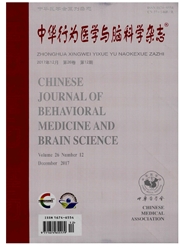

 中文摘要:
中文摘要:
目的比较抑郁症患者与正常者的自我怜悯水平,探讨抑郁症患者自我怜悯与快感缺失间的关系。方法采用中文版自我怜悯量表(SCS-C)、中文版社会快感缺失量表(RSAS-C)和中文版躯体快感缺失量表(RPAS-C)对76例不同症状水平的抑郁症患者和79例正常者进行评估,抑郁症患者同时做中文版Beck抑郁自评量表(BDI)评估,分析患者自我怜悯水平与快感缺失间的关系。结果患者组SCSC总分及其自我友善、普遍人性和正念因子得分均低于正常组(P〈0.01);患者组RSAS-C和RPAS-C得分高于对照者(P〈0.01);患者组SCS-C总分及其各个因子分与BDI得分(r=-0.699--0.610,P〈0.01)、RSAS-C得分(r=-0.446--0.391,P〈0.01)和RPAS-C得分(r=-0.481--0.429,P〈0.01)呈负相关性,控制BDI得分后,SCS-C得分与RSAS-C和RPAS-C得分间的相关性差异无统计学意义。结论抑郁症患者自我怜悯水平较低,与社会和躯体快感缺失间存在相关,这种关联受抑郁症状严重程度的影响。
 英文摘要:
英文摘要:
Objective To compare the levels of self-compassion in depression patients with those in normal population,and to explore the relationship between self-compassion and anhedonia. Methods Different levels of symptoms of 76 depression patients and 79 healthy subjects were assessed with Chinese version of revised self-compassion scale( SCS-C),Chinese version of revised social anhedonia( RSAS-C) and Chinese version of revised physical anhedonia( RPAS-C). Meanwhile,the symptoms of patients with schizophrenia were assessed by Chinese version of Beck depression rating scale( BDI). Results The patients had significantly lower SCS-C total scores and the subscores of self kind,common humanity and mindfulness than those of healthy subjects(P〈0.01). The scores of RSAS-C and RPAS-C in patients were significantly higher than those in the control group(P〈0.01). Correlation analysis showed that in the patients group,the SCS-C scores were significantly negatively correlated with the scores of BDI(r=-0.699--0.610,P〈0.01),RSAS-C(r=-0.446--0.391,P〈0. 01) and RPAS-C(r=-0.481--0.429,P〈0.01). After control of the BDI score,the researcher found that the relationship between the self-compassion and anhedonia could not maintain. Conclusion Patients with depression have self-compassion deficits. The relationship between the low level of self-compassion and anhedonia is involved in the severity of symptoms in depression patients.
 同期刊论文项目
同期刊论文项目
 同项目期刊论文
同项目期刊论文
 期刊信息
期刊信息
